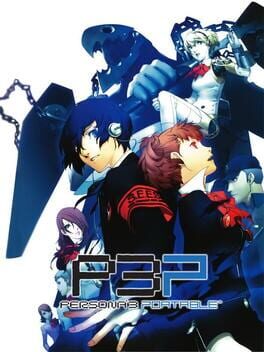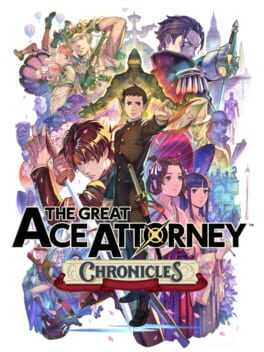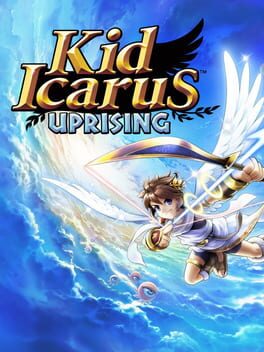Talon
Bio
Nothing here!
Badges

GOTY '23
Participated in the 2023 Game of the Year Event

GOTY '22
Participated in the 2022 Game of the Year Event

3 Years of Service
Being part of the Backloggd community for 3 years

GOTY '21
Participated in the 2021 Game of the Year Event

GOTY '20
Participated in the 2020 Game of the Year Event

Well Written
Gained 10+ likes on a single review

N00b
Played 100+ games

Popular
Gained 15+ followers

Noticed
Gained 3+ followers

Liked
Gained 10+ total review likes
Favorite Games
237
Total Games Played
000
Played in 2024
000
Games Backloggd
Recently Reviewed See More
There’s a deep seeded vulnerability to every significant character in The House of Fata Morgana, a vulnerability that is festering behind a thin shield of various defense mechanisms and a facade of the person they purport to be among others. “You instinctively accept as truth the events unfolding before you”, the title crawl declares. This could be taken at face value of course, one must accept the magical element of the story for it to hold any weight, but I also took it as a challenge of premise. The game entreats the reader to investigate the real people trapping themselves behind this fata morgana (a term for a type of mirage I embarrassingly only learned about after completing the game so if you also didn’t know, well, there you go) and observe them for the holistic human beings they are, beyond what they want or are compelled to portray themselves to be. Beyond this, I can say that narratively the game succeeds at interrogating themes of victimhood, cyclical abuse, vengeance, hatred, and personal identity with strokes of deftness and occasionally nuance as needed and that is the greatest praise I could shoulder upon it. Light spoilers for The House in Fata Morgana follow so if you're interested in reading this VN completely blind, be warned.
Now I just said that Fata Morgana’s thematic strength in relation to its fully realized characters is its greatest strength but I can’t help but contradict myself just to express how enthusiastically I have to celebrate its character art, background art, and music. These components alone are what I imagine most immediately captures every person who even mildly likes this VN so I cannot stress enough how much I would understand the argument that these are its greatest accomplishments. Every piece of background art, at least for the PC version, expresses these rough impressionistic outlines of indoor and outdoor environments that can be equally as crude and grimy and stark in visual texture and color as they can be soft and dream-like and enigmatic. There's an appreciable contrast between these dappled, almost amorphous background shapes and the beautifully detailed, porcelain-like character art realized by Moyataro. In the landscape of visual novels the character art is immediately distinct, sure, but even more than that it often allows for the oft-unsettling atmosphere to permeate through characters such as The Maid, The White Haired Girl, the Beast, and the Witch whose entire physical existences reek of uncanniness or horror or both. The CGs must bear mention here as well because the painterly quality of the facially expressive character art as well as their posing and framing within stark backgrounds is unforgettable.
Now, perhaps the most pivotal element in contributing to Fata Morgana’s atmosphere, which is equal parts dour, chaotic, dreadful, ethereal and occasionally euphoric, is the music. It's also the aspect of the game I was immediately enamored by the moment the eponymous title track coincided with the opening title crawl. The most apparent strength of the soundtrack of this VN is its willingness to let the reader steep in despairing moods accompanied with discordant tracks that can at times grate against the ear or overwhelm with a sense of discomfort and eeriness. Not every song is appreciable outside of its game context but given the eclectic variety and the distinct place that every song has in the soundtrack, I wouldn’t have it any other way. There is an abundance of vocal tracks, most of which are sung in Portuguese by Japanese singers, with different affects and vocal effects placed on them. This is certainly an oddity within the space of VNs as I understand it, but it's one I welcome given the sheer ability of the singer(s) in every song. Speaking of song placement, I cannot neglect to mention that in the case of the first half of the game wherein the reader explores four different doors in varying locations and time periods, the soundtrack is curated in a way that each door to each setting also opens a portal to a distinct sonic palate that makes each one have a greater sense of identity both within the world and in my memory. Altogether, the entire soundtrack is worthwhile and one of my new favorites in a game; I revisit at least a portion of it nearly every day.
There’s an anthological vignette structure to the first half of the narrative that is ostensibly only loosely tied by the mystery of the player character’s identity. It’s within this framework that I think Fata Morgana is most consistently impressive in its effective creation of small period pieces reflecting on sort of tangential themes like class disparity, avarice, relationships and their need for communication, the nature of man, race and gender identity. Many of these themes, while carrying over between vignettes, don’t exactly get fully realized explorations unfortunately (such as class disparity and race), but they do serve to unflatteringly portray the blemishes of the people and period in a manner that is coherent and establishes societal systems as being quite influential in the production of discriminatory and heinous acts that take place later in the story. The second door that explores the reality of a nebulous and foreboding beast that the Maid is catering to in 1707 was an immediate highlight following a tonally and atmospherically successful first vignette that played a little too close into reader expectations without much characterization of the brother and sister beyond their roles as tragic figures. This is a criticism I have of the first door, albeit one that did not impede my enjoyment of the first few hours, but it's also a purposeful trend in the first four vignettes (called doors) that pays off fantastically by the end of the fourth door as the realization that these tales curated by the Maid with tragic tones and cruel ends and all too poetic finales serve a dual purpose in punishing the characters within and obfuscating the truth from the player character.
Around the halfway mark of the narrative, the game asks the player to make an almost superficial, inevitable choice, one with a much deeper emotional resonance that I only realized much later. Without leveraging spoilers to entice any potential future readers of The House in Fata Morgana, I want to make it explicitly clear that this game is queer. I obviously cannot speak for the writer themselves, but Fata Morgana itself is a story very much predicated on the experience and themes of gender nonconformity that speaks in equal parts to intersex people and transgender people; the narrative crux pivots around this as a core element and it can’t be ignored, especially because of how empathetic and surprisingly delicately the writer handles the topic. The distinction has to be made, of course, between intersex and transgender people but with the understanding that intersex people can also be transgender, it is through this lens that Fata Morgana explores gender identity and it acknowledges this difference. There is of course some discussion to be had about the portrayal of intersex and transgender peoples in situations of despair and suffering and oppression in media, and I as neither cannot speak to it genuinely so I leave that in the hands of actual intersex and transgender people to unpack. In my limited judgement though, I think Fata Morgana takes a few missteps of language and drags out some sequences of suffering in a way that mirrors some sluggish pacing in the second half of the story in general, but ultimately affirms and celebrates these identities in a way that is some of the most respectful I have seen in media.
Briefly, I want to touch on the core themes of abuse, victimhood, hatred, and forgiveness. These are all inextricably tied together but what I found most compelling about their implementation in Fata Morgana, specifically near the end, is that the game never relents to a strict “cycles of abuse perpetuate hatred and violence and ill will and thus everyone is equally culpable and in the end nobody is really at fault(or everybody is at fault)” sort of mentality. Many of the characters in the game are fully realized in ways that often don't make them agreeable or even tangentially good people by the game’s judgement. The reader is asked to accept these characters not for their cumulative goodness or likeability, but for the human beings who have done good, bad, and everything in between that they are. All that being said, the VN also makes sure to emphasize that it is always in the hands of the victim to weigh the heinousness of the acts done upon them and determine whether they can forgive or cast off their abuser entirely. Several characters offer several different perspectives and decisions when presented with this query but it never creates a situation wherein the victim is beholden to meet their abuser(s) halfway. I can’t speak for others obviously but this was an intensely gratifying stance to me that the game reinforced constantly.
A lot of the elements of the game were similarly gratifying to me in a way that coalesced into a whole that consistently affected me. Yes, I teared up and cried on more than one occasion. I have some minor misgivings with the pacing and overly grave tone of the second half of the story, the relatively safe ending even though I somewhat made peace with it, underutilization of several key characters who could have used more fleshing out, and with some details of its exploration of gender and sexuality. All that being said, none of these came together in a way that meaningfully detracted from The House In Fata Morgana’s messaging, its characters or thematic weight. Perhaps the biggest tragedy surrounding The House in Fata Morgana, despite its notoriety in visual novel circles, is how little its merits and (relatively minor, in my view) failings are discussed or dissected, even among those who have played it, outside of overt characteristics like its art and music. Considering that I produced this review as a passionate, spoiler-skirting entreaty to play this visual novel, I am perhaps no one to talk as well. Maybe this will foster more discussion from new and old readers, maybe it won’t. So long as I contribute to the dialogue and even one person picks up this wonderful game, I can’t really complain.
Now I just said that Fata Morgana’s thematic strength in relation to its fully realized characters is its greatest strength but I can’t help but contradict myself just to express how enthusiastically I have to celebrate its character art, background art, and music. These components alone are what I imagine most immediately captures every person who even mildly likes this VN so I cannot stress enough how much I would understand the argument that these are its greatest accomplishments. Every piece of background art, at least for the PC version, expresses these rough impressionistic outlines of indoor and outdoor environments that can be equally as crude and grimy and stark in visual texture and color as they can be soft and dream-like and enigmatic. There's an appreciable contrast between these dappled, almost amorphous background shapes and the beautifully detailed, porcelain-like character art realized by Moyataro. In the landscape of visual novels the character art is immediately distinct, sure, but even more than that it often allows for the oft-unsettling atmosphere to permeate through characters such as The Maid, The White Haired Girl, the Beast, and the Witch whose entire physical existences reek of uncanniness or horror or both. The CGs must bear mention here as well because the painterly quality of the facially expressive character art as well as their posing and framing within stark backgrounds is unforgettable.
Now, perhaps the most pivotal element in contributing to Fata Morgana’s atmosphere, which is equal parts dour, chaotic, dreadful, ethereal and occasionally euphoric, is the music. It's also the aspect of the game I was immediately enamored by the moment the eponymous title track coincided with the opening title crawl. The most apparent strength of the soundtrack of this VN is its willingness to let the reader steep in despairing moods accompanied with discordant tracks that can at times grate against the ear or overwhelm with a sense of discomfort and eeriness. Not every song is appreciable outside of its game context but given the eclectic variety and the distinct place that every song has in the soundtrack, I wouldn’t have it any other way. There is an abundance of vocal tracks, most of which are sung in Portuguese by Japanese singers, with different affects and vocal effects placed on them. This is certainly an oddity within the space of VNs as I understand it, but it's one I welcome given the sheer ability of the singer(s) in every song. Speaking of song placement, I cannot neglect to mention that in the case of the first half of the game wherein the reader explores four different doors in varying locations and time periods, the soundtrack is curated in a way that each door to each setting also opens a portal to a distinct sonic palate that makes each one have a greater sense of identity both within the world and in my memory. Altogether, the entire soundtrack is worthwhile and one of my new favorites in a game; I revisit at least a portion of it nearly every day.
There’s an anthological vignette structure to the first half of the narrative that is ostensibly only loosely tied by the mystery of the player character’s identity. It’s within this framework that I think Fata Morgana is most consistently impressive in its effective creation of small period pieces reflecting on sort of tangential themes like class disparity, avarice, relationships and their need for communication, the nature of man, race and gender identity. Many of these themes, while carrying over between vignettes, don’t exactly get fully realized explorations unfortunately (such as class disparity and race), but they do serve to unflatteringly portray the blemishes of the people and period in a manner that is coherent and establishes societal systems as being quite influential in the production of discriminatory and heinous acts that take place later in the story. The second door that explores the reality of a nebulous and foreboding beast that the Maid is catering to in 1707 was an immediate highlight following a tonally and atmospherically successful first vignette that played a little too close into reader expectations without much characterization of the brother and sister beyond their roles as tragic figures. This is a criticism I have of the first door, albeit one that did not impede my enjoyment of the first few hours, but it's also a purposeful trend in the first four vignettes (called doors) that pays off fantastically by the end of the fourth door as the realization that these tales curated by the Maid with tragic tones and cruel ends and all too poetic finales serve a dual purpose in punishing the characters within and obfuscating the truth from the player character.
Around the halfway mark of the narrative, the game asks the player to make an almost superficial, inevitable choice, one with a much deeper emotional resonance that I only realized much later. Without leveraging spoilers to entice any potential future readers of The House in Fata Morgana, I want to make it explicitly clear that this game is queer. I obviously cannot speak for the writer themselves, but Fata Morgana itself is a story very much predicated on the experience and themes of gender nonconformity that speaks in equal parts to intersex people and transgender people; the narrative crux pivots around this as a core element and it can’t be ignored, especially because of how empathetic and surprisingly delicately the writer handles the topic. The distinction has to be made, of course, between intersex and transgender people but with the understanding that intersex people can also be transgender, it is through this lens that Fata Morgana explores gender identity and it acknowledges this difference. There is of course some discussion to be had about the portrayal of intersex and transgender peoples in situations of despair and suffering and oppression in media, and I as neither cannot speak to it genuinely so I leave that in the hands of actual intersex and transgender people to unpack. In my limited judgement though, I think Fata Morgana takes a few missteps of language and drags out some sequences of suffering in a way that mirrors some sluggish pacing in the second half of the story in general, but ultimately affirms and celebrates these identities in a way that is some of the most respectful I have seen in media.
Briefly, I want to touch on the core themes of abuse, victimhood, hatred, and forgiveness. These are all inextricably tied together but what I found most compelling about their implementation in Fata Morgana, specifically near the end, is that the game never relents to a strict “cycles of abuse perpetuate hatred and violence and ill will and thus everyone is equally culpable and in the end nobody is really at fault(or everybody is at fault)” sort of mentality. Many of the characters in the game are fully realized in ways that often don't make them agreeable or even tangentially good people by the game’s judgement. The reader is asked to accept these characters not for their cumulative goodness or likeability, but for the human beings who have done good, bad, and everything in between that they are. All that being said, the VN also makes sure to emphasize that it is always in the hands of the victim to weigh the heinousness of the acts done upon them and determine whether they can forgive or cast off their abuser entirely. Several characters offer several different perspectives and decisions when presented with this query but it never creates a situation wherein the victim is beholden to meet their abuser(s) halfway. I can’t speak for others obviously but this was an intensely gratifying stance to me that the game reinforced constantly.
A lot of the elements of the game were similarly gratifying to me in a way that coalesced into a whole that consistently affected me. Yes, I teared up and cried on more than one occasion. I have some minor misgivings with the pacing and overly grave tone of the second half of the story, the relatively safe ending even though I somewhat made peace with it, underutilization of several key characters who could have used more fleshing out, and with some details of its exploration of gender and sexuality. All that being said, none of these came together in a way that meaningfully detracted from The House In Fata Morgana’s messaging, its characters or thematic weight. Perhaps the biggest tragedy surrounding The House in Fata Morgana, despite its notoriety in visual novel circles, is how little its merits and (relatively minor, in my view) failings are discussed or dissected, even among those who have played it, outside of overt characteristics like its art and music. Considering that I produced this review as a passionate, spoiler-skirting entreaty to play this visual novel, I am perhaps no one to talk as well. Maybe this will foster more discussion from new and old readers, maybe it won’t. So long as I contribute to the dialogue and even one person picks up this wonderful game, I can’t really complain.




